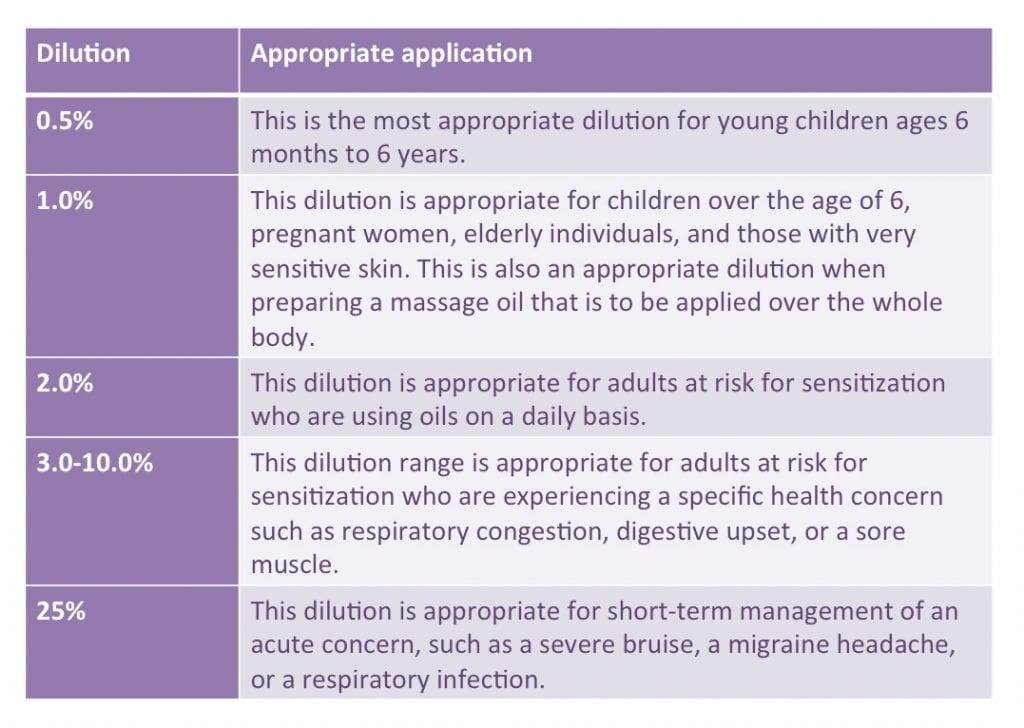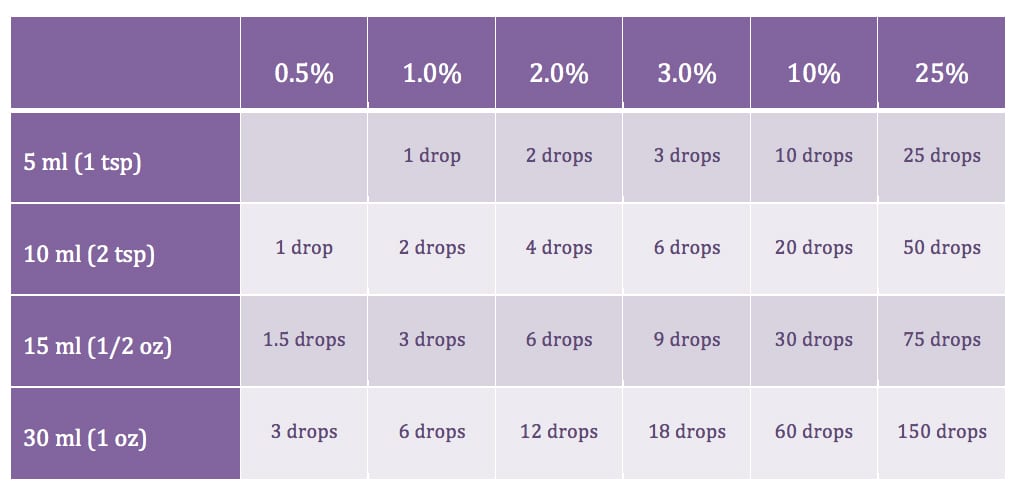THREE REASONS TO CONSIDER DILUTING ESSENTIAL OILS
|

Many essential oil users apply oils without dilution and never experience any problems. Personally (knock on wood) I have not experienced any adverse consequences from neat (undiluted) application of essential oils, nor have members of my family. But I am always one to err on the side of caution and am aware that many of my patients fall into the category of “sensitive”. Therefore I wanted to provide guidance in this article and the previous one about who might want to consider diluting essential oils for topical use and how to go about doing that.
Why would you consider diluting essential oils? There are a few reasons:
- Most importantly, in order to avoid irritation and sensitization. Many people are able to use neat essential oils without any problem, but certain people are at elevated risk for sensitization (such as those with dermatitis, eczema, or other conditions listed in this post). These people should consider diluting essential oils, especially if they use them on a daily basis.
- In order to reduce the expense associated with essential oil therapy.
- Because in some situations diluted essential oils exert a stronger therapeutic effect.
How to dilute essential oils for various ages and situations

Essential oil dilution chart

Essential oils that require more dilution than others in order to avoid irritation and/or potential sensitization when applied topically
- Bergamot – 0.5%
- Birch – 3.0%
- Cinnamon bark – 0.5%
- Clove bud – 0.5%
- Fennel – 3.0%
- Grapefruit – 5.0%
- Lemon – 3.0%
- Lemongrass – 1.0%
- Lime – 1.0%
- Melaleuca – 15%
- Oregano – 1.0%
- Peppermint – 5.0%
- Sandalwood – 2.0%
- Thyme – 1.0%
- Wintergreen – 2.0%
- Ylang ylang – 1.0%
Why diluted essential oils may exert a stronger therapeutic effect than neat (undiluted) essential oils
We have a tendency to think that if a little is good, a lot is better. It is hard for us to imagine how a single drop of essential oil could exert a potent therapeutic effect. But keep in mind that a single drop of essential oil contains 40 quintillion molecules (that’s 40 with 19 zeros after it!). There are approximately 100 trillion cells in your body. So assuming that you absorbed 100% of that drop and assuming that it was evenly distributed around your body (neither of which would actually happen, but just for the sake of illustration), that one drop of essential oil could cover each one of your cells with 400,000 molecules!
There are two reasons that diluted essential oils may, in fact, exert a greater therapeutic effect than neat essential oils:
First, their volatile chemical nature means that essential oils evaporate extremely quickly. When applied to the skin undiluted, a significant percentage of the essential oil molecules evaporate into the surrounding air without ever being absorbed through the skin. In contrast, fatty carrier oils (such as fractionated coconut oil) are non-volatile and will not evaporate at all. A fatty carrier will actually serve to “weigh down” the essential oil molecules, keeping them in contact with the skin for long enough to be absorbed.
Second, spreading a given dose of essential oil over a larger skin surface will result in greater absorption. It is difficult to spread a single drop of essential oil over more than a few square inches of skin before it soaks in or evaporates (in actuality both are taking place). By diluting that single drop of essential oil in a fatty carrier oil, it becomes possible to distribute it over a much larger surface area of skin. This results in a larger percentage of the essential oil being absorbed.
Recommended carriers
In most cases we recommend fractionated coconut oil (also called liquid coconut oil) as an excellent neutral carrier. It absorbs through the skin quickly and does not leave a greasy residue. It is does not have any odor and is less likely than other fatty oils to stain laundry. It remains liquid at all temperatures and has a thin consistency, so it can easily be used in roller applicators and even sprayers.
If you are seeking a massage medium (an oil that will remain on the skin without absorbing), grape seed and sweet almond oil are good choices. Regular coconut oil is another option, as long as it becoming solid at lower temperatures is not a problem.
In some cases, water can be a useful carrier for essential oils. For instance, each day we spray our parrots with a mixture of essential oils and distilled water. In another example, I recently had a patient whose skin was extremely itchy. I wanted a way to distribute a low dilution of soothing essential oil over a large area of her skin, yet I wanted her skin to be able to breathe so I didn’t want to use a fatty oil carrier. I mixed a few drops of essential oils in a 1 oz sprayer bottle with distilled water. Two things to note when you are diluting essential oils with water — oil and water don’t mix, so you need to shake the bottle almost continuously while you are applying the mixture in order to maintain an even dilution. Second, mixing essential oils with water will not help to prevent evaporation of the essential oil as mixing essential oils with a fatty oil does. Mixing essential oils with water does offer the benefit, however, of enabling you to distribute the essential oil over a large surface area which will enhance its absorption.
Essential oils can be added to various salve recipes in order to create solid ointments. For example:
All Purpose Healing Salve (1% dilution)
- 1/2 cup olive oil
- 1/2 cup coconut oil
- 1/4 cup beeswax
- 30 drops Melaleuca
- 30 drops Lavender
Melt the beeswax in a double boiler or in a glass jar placed in a pan of hot water (be aware that you won’t ever be able to completely remove beeswax from this container, so I recommend dedicating an old pan, a small Crock-Pot, or a Mason jar to the purpose of melting and mixing salves). Add the olive oil and coconut oil and stir. Let the mixture cool down a bit before adding the essential oils (don’t wait too long or it will harden and become difficult to stir). Pour into two 4 oz glass jars. This salve can be used for many purposes, including insect stings or bites, cuts and scrapes, itchy or chapped skin, burns, and sunburns.
Supplies
Fractionated coconut oil can be purchased from HEB or Drug Emporium (sold as Nature’s Way brand liquid coconut oil). These stores also stock a variety of other oils that can be used as carriers. Beeswax is available from Homestead Heritage, at the Waco Farmer’s Market, and at Vitamin Cottage Natural Grocers in Temple. 5 and 10 ml roller bottles and 1 oz spray bottles are available for purchase at Live Oak Acupuncture. The other option is to save your empty essential oil bottles and reuse them.
